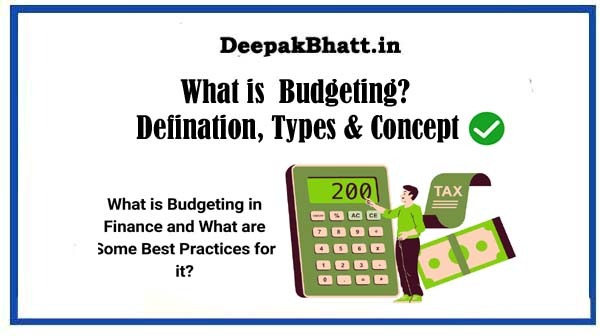Budgeting: In the symphony of personal finance, the budget serves as the conductor, orchestrating …
Financial harmony and guiding individuals toward their financial goals.
A budget is more than a set of numbers; it’s a roadmap for financial success, a tool for empowerment, and a key element in achieving a secure and balanced financial life.
Complete the JavaScript Freemium Free Course
Web Development Bootcamp With 85% Discounted
In this comprehensive guide, we will delve into the world of budgeting, exploring its definition, types, benefits, and practical strategies for creating and sticking to a budget.
What is Income? Defination, Types & Concept
What are Libilities? Defination, Types & Concept
What is an Asset? Defination, Types & Concept
- 1 Defining a Budget
- 2 Types of Budgets
- 3 Benefits of Budgeting
- 4 Practical Strategies for Budgeting
- 5 Common Budgeting Challenges and Solutions
- 6 Frequently Asked Questions (FAQs)
- 6.1 1: How often should I review my budget?
- 6.2 2: Can budgeting help with saving for retirement?
- 6.3 3: Is it necessary to follow a strict budget?
- 6.4 4. Budgeting – Simple Definition?
- 6.5 5. Importance of Budgeting?
- 6.6 6. Budgeting Concept?
- 6.7 7. Simple Budgeting?
- 6.8 8. Budgeting Examples:
- 6.9 9. Budgeting in Business:
- 6.10 10. Budgeting for Students:
- 6.11 11. How to Do Budgeting:
- 6.12 12. Introduction of the Budget:
- 6.13 13. Difference Between Budget and Budgeting:
- 6.14 14. Budgeting Importance in Business:
- 6.15 15. Three Main Purposes of Budgeting:
- 6.16 16. Definition of Budget in PDF:
- 6.17 17. 10 Key Benefits of Budgeting:
- 6.18 18. Three Types of Budgets:
Defining a Budget
A budget is a financial plan that outlines income and expenses over a specific period.
It serves as a roadmap for managing and allocating financial resources, providing a structured framework for individuals, families, and businesses to achieve their financial objectives.
Budgeting involves tracking income, categorizing expenses, and making intentional decisions about spending and saving.
Types of Budgets
1. Zero-Based Budget
In a zero-based budget, every dollar of income is allocated to a specific category, leaving no room for unassigned funds.
The goal is to “zero out” the budget, ensuring that income minus expenses equals zero.
This type of budgeting encourages intentional decision-making and can be particularly effective for those looking to control discretionary spending.
2. Incremental Budget
An incremental budget involves adjusting the previous period’s budget to account for changes or growth.
It is a more flexible approach, allowing for incremental adjustments based on evolving financial circumstances. This type of budgeting is common in businesses and organizations.
3. Envelope Budget
The envelope budgeting method involves allocating a specific amount of cash for each spending category and placing the cash in separate envelopes.
Once an envelope is empty, spending in that category stops. This tangible approach helps individuals visualize and limit discretionary spending.
4. Value-Based Budget
A value-based budget aligns spending with personal values and priorities. It involves allocating a larger portion of the budget to areas that bring the most fulfillment or contribute to long-term goals.
This type of budgeting emphasizes the importance of aligning financial decisions with one’s values.
Benefits of Budgeting
1. Financial Awareness
Creating a budget fosters financial awareness by providing a clear picture of income, expenses, and overall financial health.
It helps individuals understand where their money is going and identify areas for improvement.
2. Goal Achievement
A budget serves as a strategic tool for goal achievement. Whether saving for a vacation, a home, or retirement, budgeting allows individuals to allocate resources intentionally toward their financial objectives.
3. Debt Management
Budgeting is a powerful tool for managing and reducing debt. By allocating funds specifically for debt repayment, individuals can make consistent progress toward becoming debt-free.
4. Emergency Preparedness
A well-structured budget includes provisions for emergency funds. This financial cushion provides a safety net during unexpected expenses, preventing individuals from going off-budget due to unforeseen circumstances.
Practical Strategies for Budgeting
1. Track Your Income and Expenses
The foundation of a budget lies in understanding your financial inflows and outflows.
Track all sources of income and categorize your expenses. This can be done manually or with the help of budgeting apps and tools.
2. Establish Financial Goals
Set clear financial goals that align with your values and priorities. Whether it’s saving for a down payment, paying off debt, or building an emergency fund, having specific goals provides direction to your budget.
3. Categorize Your Expenses
Categorize your expenses into fixed and variable categories. Fixed expenses, such as rent or mortgage payments, remain consistent, while variable expenses, like groceries or entertainment, may fluctuate. Understanding these categories helps in effective budget planning.
4. Differentiate Between Needs and Wants
Distinguish between essential needs and discretionary wants. While needs are non-negotiable, wants can be adjusted based on your financial priorities.
This differentiation is crucial for making informed decisions when allocating funds.
5. Create a Realistic Budget
A realistic budget takes into account your current financial situation. Be honest about your income and expenses, and avoid setting unrealistic expectations.
A budget should be a tool that helps you succeed, not a source of frustration.
6. Review and Adjust Regularly
Financial circumstances change, and a budget should adapt accordingly. Regularly review your budget, track your progress toward financial goals, and make adjustments as needed. Flexibility is key to a successful budgeting strategy.
Common Budgeting Challenges and Solutions
1. Irregular Income
For those with irregular income, budgeting can be challenging.
In such cases, it’s advisable to create a variable income budget, estimating a baseline income and adjusting expenses accordingly during high-income months.
2. Unexpected Expenses
Unexpected expenses can throw off even the most carefully crafted budget.
To address this challenge, build an emergency fund within your budget to cover unforeseen costs without derailing your financial plan.
3. Dealing with Debt
Managing debt within a budget requires a dedicated strategy. Allocate a portion of your budget to debt repayment, focusing on high-interest debts first. As you pay off debts, reallocate those funds to other financial goals.
Frequently Asked Questions (FAQs)
1: How often should I review my budget?
A: It’s recommended to review your budget monthly. This allows you to track your progress, make adjustments, and stay on top of your financial goals.
2: Can budgeting help with saving for retirement?
A: Yes, budgeting is a powerful tool for saving for retirement. By allocating a portion of your income to retirement savings consistently, you can build a nest egg for the future.
3: Is it necessary to follow a strict budget?
A: The level of strictness in budgeting depends on individual preferences and financial goals. While some may benefit from a strict budget, others may find success with a more flexible approach. The key is to find a method
4. Budgeting – Simple Definition?
Budgeting is planning and managing financial resources by creating a detailed outline of expected income and expenses over a specific period.
5. Importance of Budgeting?
It is crucial for controlling spending, saving for the future, and achieving financial stability for individuals and organizations.
6. Budgeting Concept?
Involves forecasting and planning future financial activities to ensure responsible and effective financial management.
7. Simple Budgeting?
Involves creating a basic plan outlining income sources, anticipated expenses, and savings goals for straightforward financial management.
8. Budgeting Examples:
Examples include monthly plans for rent, utilities, and groceries, and allocating income to savings and debt repayment.
9. Budgeting in Business:
Involves planning and controlling financial resources to achieve organizational goals, manage costs, and ensure financial stability.
10. Budgeting for Students:
Helps students manage expenses, allocate money for education-related costs, and develop responsible financial habits.
11. How to Do Budgeting:
Identify income sources, list expenses, allocate funds, prioritize spending, and regularly review and adjust the budget.
12. Introduction of the Budget:
Outlines financial goals, income sources, and estimated expenses to provide an overview of the financial plan.
13. Difference Between Budget and Budgeting:
A budget is a specific plan, while budgeting is the ongoing process of creating, monitoring, and adjusting that plan.
14. Budgeting Importance in Business:
Crucial for planning, controlling costs, setting financial targets, and ensuring efficient resource use in businesses.
15. Three Main Purposes of Budgeting:
Planning (setting financial goals), controlling (monitoring and adjusting expenses), and evaluating performance (comparing results with expectations).
16. Definition of Budget in PDF:
A detailed financial plan in PDF format outlining income, expenses, and savings over a specific period.
17. 10 Key Benefits of Budgeting:
Financial planning, controlling spending, avoiding debt, saving for goals, providing a roadmap, and fostering financial discipline.
18. Three Types of Budgets:
Operating budgets (daily expenses), capital budgets (long-term investments), and cash budgets (managing cash flow).
आप सभी का मेरी वेबसाइट पर स्वागत है। मैं Blogging, earning money online और अन्य Categories से संबंधित Post Updates करता रहता हूँ। यहाँ आपको बहुत अच्छी Post पढ़ने को मिलेंगी। जहाँ से आप बहुत सारा Knowladge बढ़ा सकते हैं। आप हमारी website और Social Media के माध्यम से हमसे जुड़ सकते हैं। धन्यवाद







